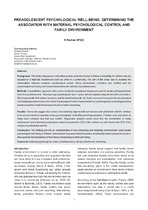| dc.contributor.author | Roman, Nicolette V. | |
| dc.date.accessioned | 2017-05-12T11:33:55Z | |
| dc.date.available | 2017-05-12T11:33:55Z | |
| dc.date.issued | 2012 | |
| dc.identifier.citation | Roman, N. (2012). Preadolescent psychological well-being: determining the association with maternal psychological control and family environment. Journal of Community and Health Science, 7:2 | en_US |
| dc.identifier.issn | 1990-9403 | |
| dc.identifier.uri | http://jchs.epubs.ac.za/index.php/jchs/article/view/92/85 | |
| dc.identifier.uri | http://hdl.handle.net/10566/2839 | |
| dc.description.abstract | Background:
Methods:
Results:
Conclusion:
Keywords:
The family and parents could either provide protective factors or initiate vulnerability for children who are
exposed to a high-risk environment such as crime in a community. The aim of this study was to examine the
relationships between maternal psychological control, family environment (cohesion and conflict) and the
psychological well-being (self-esteem and satisfactionwith life) of preadolescents.
A quantitative approach with a cross-sectional correlational design was used to obtain self-reported data
from 412 preadolescents. The mean age of participants was 11 years with themajority being female (60%) in Grade 5.
The Coopersmith Self-esteem Inventory and the Satisfaction with Life Scale were used to assess the psychological
well-being of preadolescents, the Parent Psychological Control Questionnaire for psychologically controlling parenting
practices and the Family Environment Scale for family functioning.
The results suggest that scores were relatively high on both self-esteem and satisfaction with life. Mothers
were not perceived as applying strong psychologically controlling parenting practices. Families were perceived as
being more cohesive and had less conflict. Regression analysis results show that the combination of family
environment and maternal psychological control accounted for 22% of the variance in self-esteem and 12% of the
variance in satisfactionwith life.
The findings provide an understanding of how enhancing and hindering environments could predict
psychological well-being of children. Interventions for parents should include a broad family-based perspective so as to
show parents the implications of their choice of parenting on child well-being. | en_US |
| dc.language.iso | en | en_US |
| dc.publisher | University of the Western Cape | |
| dc.rights | All the contents of this journal, except where otherwise noted, is licensed under a Creative Commons Attribution License | |
| dc.subject | Maternal psychological control | en_US |
| dc.subject | Preadolescence | en_US |
| dc.subject | Family environment | en_US |
| dc.subject | Well-being | en_US |
| dc.title | Preadolescent psychological well-being: determining the association with maternal psychological control and family environment | en_US |
| dc.type | Article | en_US |

